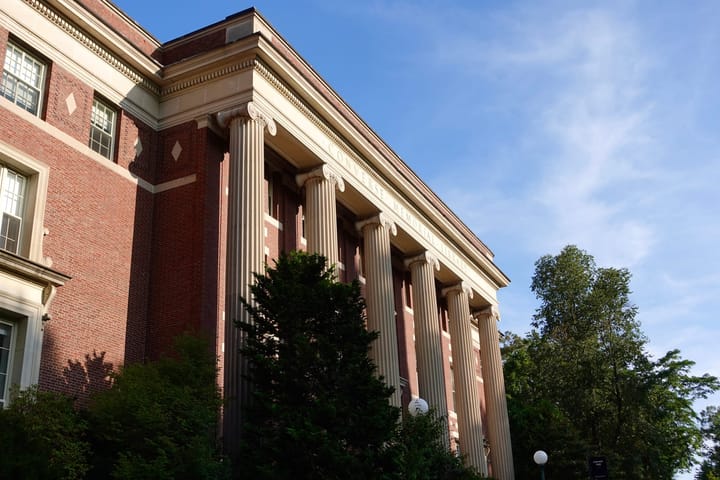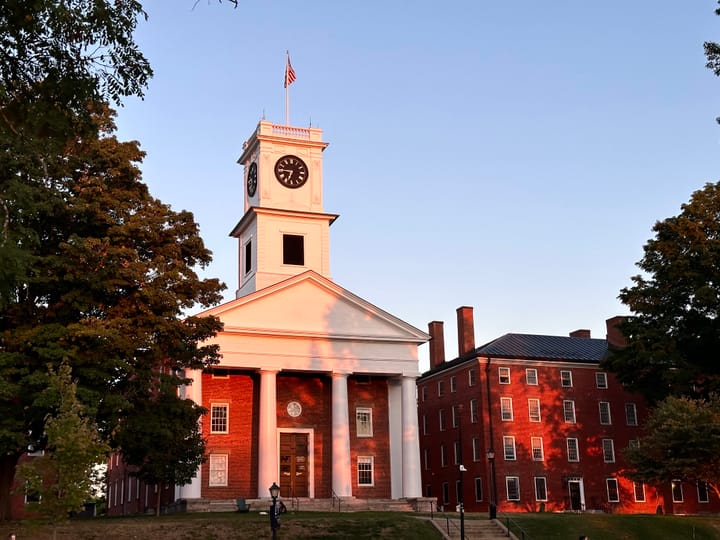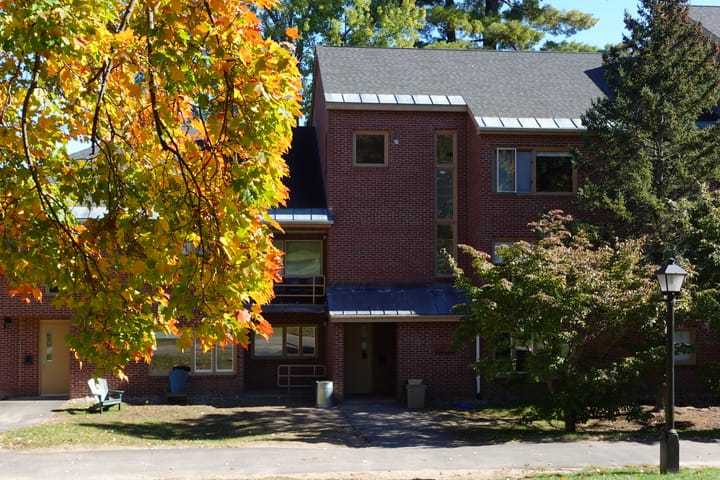A Shutdown For Our Times
Staff Writer John Milas ’28 dissects the latest government shutdown as more than a budgetary standoff — framing it instead as a mirror of America’s collective precarity.
In a government shutdown, everything comes to a standstill. Your federal job? Furloughed if lucky. Federal economic data? Delayed or suspended. That federal research grant? Not happening. If something — or someone — isn’t deemed “essential,” it’s on the chopping block, either because there are no funds or because it’s become a pawn in a ruthless political game.
However, this game is not a tactical one like chess. This game has no rules; you make them up as it goes, turning the board over and vaulting the pieces at your opponent’s face. Guile and wit do not work in a zero-sum shutdown.
Thus, the parties have had to resort to the next best technique: strangulation. The public has to get hurt, and it has to get angry, and this process must repeat until it's had enough. Since the shutdown’s start on Oct. 1, President Donald Trump has made a bet: The struggling Democratic base will abandon their party, forcing the hand of its humiliated leadership. Conversely, the Democrats have run on the hope that Americans will blame the president for their sorrows. But both sides seem to agree: Some people have to suffer before the dust can settle. Why has this happened? Why has pain become a means to these political ends?
Ostensibly, the standoff is all about subsidies for the Affordable Care Act (ACA). In 2021, the administration of former President Joe Biden expanded the scope of the ACA, making healthcare cheaper for millions. Yet the amendments will expire unless renewed by Congress before the year’s end. The Democrats have put their foot down, telling us that now, and only now, can the renewal happen. If the government has to shut down, so be it.
The party’s political calculus is reasonable enough. The ACA remains broadly popular in ways the Democrats are not, so it seems wise to champion the act. More importantly, this is their only shot to do so; the Dems are in the wilderness, they have no leverage after the government gets funding.
Indeed, that hints at something deeper and tenderly emotional — the true reason that we’re here. Yes, the ACA healthcare subsidies are essential for millions of Americans, but this crisis does not boil down to mere insurance policy. This is something new. Compare today to 2013, when the Republicans shut down the government to tank the ACA. Their efforts drew quite the commotion, but they timidly relented after just 16 days. In theory, the Republicans scored a “compromise,” but it was obviously a capitulation. Then-House Speaker John Boehner put it bluntly: “We fought the good fight, we just didn’t win.” Imagine if Senate Minority Leader Chuck Schumer or Senate Majority Leader John Thune weaseled out that remark! No, they could never sigh and exclaim, “We just didn’t win, we’ll get ‘em next time,” because if they don’t win, there won’t be a next time. This is, after all, not a policy shutdown, it’s an existential crisis.
Only now do the Democrats feel like there are no other options. Glossy-eyed, they can only watch as the Trump administration runs roughshod over institutions, mangles constitutional rights, and smashes norms and laws once thought eternal. For so long, they believed in a romantic image of a gallant, post-racial America, a liberal world order at the end of history. But no multiracial democratic majority ever materialized; the dream is shattered, the old America is gone. With dazzling speed, Trump is rebuilding it in his own image, in law, culture, and granite itself.
Yet Republicans, too, believe it or not, feel precarious. Their most populist leaders favor fire-and-brimstone rhetoric. One might say, for instance, that liberal ideology has a hellish grip over American life, that it’s streaming out from porous hordes of woke college elites and immigrants who challenge the very meaning of American identity. These feelings are not as ridiculous or unintelligible as some might think. For better or worse, America has undergone dramatic change. Countless cultural underpinnings have indeed been questioned, ridiculed, and replaced with great urgency. Some of those updates have been wonderful, especially for a low-income student like me, but every inclusion has demanded some exclusion. After all, the media, for instance, can only embrace so many social groups, symbols, and ideals; to platform some, something must be displaced. As such, the future is opaque and alien for so many people. Their expectations are now ridden with dread.
All of this means that both sides cannot give up or give in. They must bear the pain, and they have to claim victory because acknowledging failure communicates doom. You might scoff at the anxieties of one side or the other, but we cannot ignore their existence or their immediate results. The scariest result is one I have yet to mention: for the first time in the program’s history, food stamp benefits are in abeyance.
The Supplemental Nutrition Assistance Program (SNAP) was a core achievement of former President Lyndon Johnson’s Great Society campaign in the 1960s. Johnson’s bill gave poor families funds to feed themselves. As he put it, it was designed to serve as “one of [the] most valuable weapons for the war on poverty.” While it hasn’t ushered in the utopian dream of 1960s reformers, it’s certainly helped millions of Americans, including those too poor to be considered “working class.”
However, as I write this, millions may miss out on these all too necessary funds. Without appropriations, the program will not give out money, unless it’s quickly pumped with emergency cash. Yet despite its predilection for creative accounting and unusual legal maneuvering, the Trump administration claimed that it had no authority to fund the benefits, until a court finally said otherwise. It now seems like some food stamps will arrive, though a limited amount, and even that with delays and almost certain bureaucratic hiccups.
But even if low-income Americans get this piecemeal aid, the fear that now haunts them cannot be easily shaken off. If the politicos in Washington are willing to let the program die through inaction, then God knows when they’ll be ready to kill it with menace. Food aid recipients have long been the object of ridicule: Take a glance at the portrait of the Welfare Queen, a racialized stereotype and epithet that became a favorite target of conservative critique a few decades ago. Given the commanding influence of the wealthy and the presence of widening inequality, it's not hard to imagine a world where the shackles of welfare are cast aside for the glory of a “rugged individualism” that dismisses lives as if they were parasites.
Indeed, this is quite a precarious world. Life at Amherst is obviously stressful, but poverty in a shutdown makes it a lot crueler. Personal and academic stresses are amplified by a far more sinister fear: my own family may have little to eat, for days or for weeks or however long it ends up being. It’s hard to study or write or do much else without staring into the air, thinking that lonely thought, and realizing that I can’t do much about it. I’m sure others at the college are in the same boat, though I don’t know who — they must carry the same frustration, the same lonesome instability and peculiar, inexplicable fear.
We would not be alone in that regard. Amherst’s history is host to many instances of powerless anxiety; look towards the records of The Student and you’ll find, for instance, writers who feared the looming specter of the Vietnam draft. For those students, the future was uncertain and dangerous, and precarity often brought them to political frustration and action.
This shutdown is captured by the same sentiment. All around us, feelings of rootlessness and instability have brought political leaders to a dramatic impasse with evidently disastrous results. This whole bureaucratic catastrophe has raised innumerable anxieties; federal job security lies in stasis, and millions of Americans fear outright hunger. In this way, the shutdown stands as a dark symbol for our current political moment, where Americans are politically anxious to an unprecedented degree and where policy compromise is never enough. Truly, then, this is a distinctly modern crisis — a shutdown for our times.





Comments ()